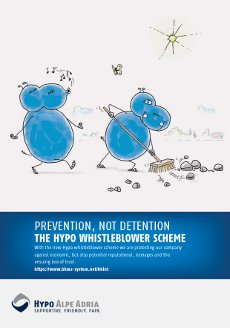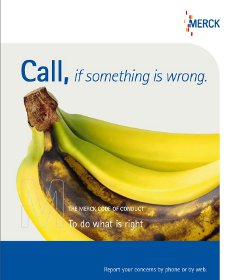Comprehensive Ways of Communication on Anti-Corruption Measures and Compliance
Nowadays, there is agreement within companies and the public that neither corruption nor other contraventions of national and international regulations are acceptable. Corruption causes an estimated economic harm of up to US $4 trillion per year; the number of unreported cases and not quantifiable social harm through the erosion of trust and the economic systems is much higher. As is publically known, companies such as Wal-Mart, Monsanto, and General Electric were strongly sanctioned by government and society for their corrupt business activities. In times of financial crisis, a sustainable business model is more important than ever to ensure the necessary social acceptance and “license to operate”.
This is one of the reasons why multinational companies – and not only members of the Global Compact that comply with the Principle 10 – have established compliance units in order to guide and control the legal behavior of all actors in the company. Even an increasing number of small and medium-sized companies have started to establish a structured approach to avoid risks that result from the disregarding of laws.
| Initiator | Business Keeper AG |
| Project start | - |
| Status | ongoing |
| Region | Worldwide |
| Contact person | Jenice Hartmann |
| Awards | - |
Project benefit
- Fight corruption
- Strengthen transparency
| Anti-Corruption | X |
| Business & Peace | - |
| Development | - |
| Environment | - |
| Financial Markets | - |
| Implementing UNGC Principles in your Corporate CSR Management | - |
| Human Rights | - |
| Labour Standards | - |
| Local Networks | - |
| Advocacy of global issues | X |
| Business opportunities in low income communities/countries | - |
| Project funding | - |
| Provision of goods | - |
| Provision of services/personal | - |
| Standards and guidelines development | - |
There are many stakeholders who should be informed about companies’ targets, measures, and projects regarding the prevention of corruption. As part of the external communication, the organization has to provide different sources, such as homepages and corporate reporting (annual / sustainability reports) to inform customers, suppliers, the government, and society about their activities.
However, the documents that compliance departments usually elaborate upon – that is to say codes of conduct and guidelines on different topics, for example anti-corruption guidelines – should also be known by another, very important stakeholder group: the employees. Unfortunately, these documents often remain unnoticed in the everyday work process and are therefore not sufficiently effective.

In order to establish an effective and accepted compliance management within the organization, a first and important step is to make employees aware of an issue’s relevance. The challenges that compliance units face are providing a convincing introduction and to continuously communicate the principles of responsible conduct and accompanying measures. The admittedly rather dry nature of juridical facts, rules, and laws may create even greater difficulties. Moreover, some employees may be of the opinion that compliance impedes economic success and has a negative connotation. Therefore, it is one thing to establish guidelines and codes, but bringing them to life, getting the message across, and teaching employees how to act responsibly, to respect the fine line between prohibited and allowed behavior, and to recognize this grey area is another thing completely.
“To establish compliance processes, structures, codes of conduct, and to integrate an effective whistleblowing system normally outweighs the effort to set up adequate communication measures. We need to develop a certain awareness regarding the communication toward the desired target group. Communication is crucial for the success, acceptance, and efficiency of the compliance program,” says Kenan Tur, founder and Executive Board Member of the Business Keeper AG.
Hence, communication on compliance must be practically-oriented, innovative, and convincing. Only through the continuous sensitization of employees regarding the important topic of anti-corruption and compliance can lasting changes be achieved and an overall consciousness of value-based economic practices be developed and maintained.
Thus, it is advisable to tackle the corporate culture, which in turn may necessitate a change management. Following the theory of Kurt Lewin, the first step is to catch freezing. This can be reached, for example, by offering the clear positioning of the CEO on the topic of anti-corruption. Announced in different communication channels, it emphasizes the relevance of compliance with the support of the top management and shows that the written values are actively pursued. During the second phase, the moving, new solutions are generated, new behaviors are tried, and a change movement is carried out. At this point, the employees must be addressed with adequate communication instruments and be sensitized to these. The ideal case would entail integrated thinking, which means that integrity and compliance are automatically included as elements of every decision within the company. Within the context of the last phase, the refreezing – allowing employees to report on misbehavior – communication channels that should be used are defined in case misconduct is observed. The manifold possibilities include the line manager, the compliance team, and a functioning whistleblowing system that guarantees confidentiality or even anonymity.

In this context, it is advisable that the compliance units make use of the specific competences of the communication departments. A campaign using joint forces may be much more effective than the mere dissemination of compliance content.
For too long, compliance departments have disregarded the fact that communication toward the target group not only needs to be informative but also convincing in order to increase consciousness and encourage acceptance for compliance issues and whistleblowing systems. Internal communication on compliance topics must nowadays be practical and true-to-life. Therefore, compliance and corporate communication departments have to align their communication efforts and implement more innovative tools to close this gap. Globally engaged enterprises are faced with the challenge of deciding which communication measures accompany the launch of a whistleblowing system. On the one hand, they could implement centralized and globally stringent communication, which is culturally inherent. On the other hand, they could decide to consider cultural differences – for example, based on historical incidents in the country – communicate in a decentralized manner, and thereby experience higher acceptance, with the latter being surely the preferable way to address the topic.
It needs to be considered that compliance without adequate communication can lead to the same risks as the nonexistence of compliance – or even worse. With respect to recent scandals in the corporate world, one can ask why contraventions still occur even if extensive compliance structures have been built. One of the reasons might be that the potential of a genuine compliance communication has not yet been exploited.
Business Keeper AG
The Business Keeper AG is located in Berlin, Germany, and provides the BKMS® System as a unique solution for companies and organizations to establish a 24/7 whistleblowing system in order to discover contravention and misconduct at an early stage. Today, the BKMS® System is used in more than 196 countries and regions worldwide and is available in 52 languages. Customers of the Business Keeper AG appreciate the certified security of the application as well as the fact that no one except the authorized examiners has access to the data. The postbox functionality, which the whistleblower can use while remaining anonymous, bridges the gap between anonymity and the dialogue between the examiner and the whistleblower. Possessing more than 10 years of experience, the Business Keeper AG is a reliable and competent compliance partner for companies and organizations.
This project description was originally presented in the Global Compact International Yearbook 2013.
Jenice Hartmann is an employee of Business Keeper.
About Business Keeper AG
The Business Keeper AG’s founder’s past experiences with white-collar crime as a manager in an international company, along with a heightened awareness of the subject of business ethics gained during his studies of economics and computer science, led Kenan Tur to establish Business Keeper in 2001 and develop the Business Keeper Monitoring System (BKMS® System).
Business Keeper AG offers organisations and their stakeholders, i.e. those affected by white-collar crime, the ability to report such activities while being protected from physical and emotional harm. White-collar crime should be detected as early as possible and through the early identification of this risk factor "human misconduct", the effects of such acts can be avoided. Business Keeper AG aims to help in the development of an ethical, value-based corporate culture.
Write a comment about this page
Your comments are provided by your own free will and you take sole responsibility for any direct or indirect liability. In order to maintain the highest discussion quality, all comments will be reviewed by our editors. You hereby provide us with an irrevocable, unlimited, and global license for no consideration to use, reuse, delete or publish comments in accordance with our Community Guidelines.
About Us // Privacy Policy // Copyright Information // Legal Disclaimer // Contact
Copyright © 2012-2018 macondo publishing GmbH. All rights reserved.
The CSR Academy is an independent learning platform of the macondo publishing group.








